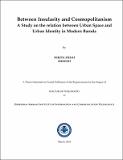Please use this identifier to cite or link to this item:
http://drsr.daiict.ac.in//handle/123456789/786Full metadata record
| DC Field | Value | Language |
|---|---|---|
| dc.contributor.advisor | Pandya, Vishvajit | |
| dc.contributor.advisor | Mazumdar, Madhumita | |
| dc.contributor.author | Desai, Nikita | |
| dc.date.accessioned | 2019-03-19T10:52:15Z | |
| dc.date.available | 2019-03-19T10:52:15Z | |
| dc.date.issued | 2018 | |
| dc.identifier.citation | Desai, Nikita (2018). Between Insularity and Cosmopolitanism: a Study on the relation between Urban Space and Urban Identity in Modern Baroda. Dhirubhai Ambani Institute of Information and Communication Technology, xii, 319 p. (Acc. No: T00745) | |
| dc.identifier.uri | http://drsr.daiict.ac.in//handle/123456789/786 | |
| dc.description.abstract | Located in the State of Gujarat, the city of Baroda or Vadodara is described a Sanskarnagri, the state's cultural capital and a cosmopolitan urban space. This thesis challenges this image of Vadodara and its current city branding efforts that draw upon the modernizing vision of Sayajirao, the city's industrial entrepreneurship and culturally diverse migrant population; arguing that the city's larger spatial organization, particularly its residential settlements demonstrate a marked preference for the spatial seg- regation of communities. Through an examination of the connections between urban identity creation and urban design, the thesis demonstrates that the Baroda's cosmopolitan identity resides within its public institutions and spaces, concentrated in the western part of the city. This identity is at odds with the traditional (residential) private spaces and their inherent rules of spatial and social segregation of communities that originate in the walled city and its pols. In using Henri Lefebvre's theories of the Production of Space1 as an analytic basis, the study highlights how the formulation and unfolding of the urban plan and urban design interventions from 1885 to 2015 aided in created and continuity of spatial tensions be- tween the spaces of the old and new cities and their respective identities of insularity and cosmopolitanism. The thesis includes field studies of three significant settlements, the walled city pol, Fate- hgunj and Tandalja-Vasna. | |
| dc.publisher | Dhirubhai Ambani Institute of Information and Communication Technology | |
| dc.subject | Modernism | |
| dc.subject | Cosmopolitanism | |
| dc.subject | Cultural value | |
| dc.subject | Urban planning | |
| dc.subject | Cosmopolitan image | |
| dc.subject | Economic change | |
| dc.subject | Insularity | |
| dc.subject | Urban design | |
| dc.subject | Cosmopolitan identity | |
| dc.subject | Continuity and Change | |
| dc.classification.ddc | 307.76095475 DES | |
| dc.title | Between insularity and cosmopolitanism: a study on the relation between Urban Space and Urban Identity in modern Baroda | |
| dc.type | Thesis | |
| dc.degree | Ph.D | |
| dc.student.id | 201021015 | |
| dc.accession.number | T00745 | |
| Appears in Collections: | PhD Theses | |
Files in This Item:
| File | Description | Size | Format | |
|---|---|---|---|---|
| 201021015_NikitaDesai.pdf | 201021015 | 19.25 MB | Adobe PDF |  View/Open |
Items in DSpace are protected by copyright, with all rights reserved, unless otherwise indicated.
